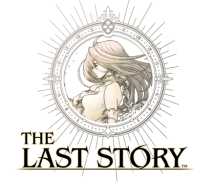6. An Audio Director for Future Games
I believe that if games are going to develop in this way in the future, then they’ll need an audio director.
You mean someone who will oversee the creation of all the audio content?
That’s right. But I’m not talking about the person actually making the music. I mean someone whose role is to oversee the whole process, from ambient sounds to the way the music is used, and how precisely it sounds. I think this is a role that may well be required in video games in the future.
Yes, focusing in greater detail on the audio design would greatly add to the realism. But this specialist role doesn’t really exist. Games don’t seem to be at that stage yet.
In real life, the impression you get totally changes depending on the vibrancy of sound. As it’s hard to be objective about something you have created yourself, what we’re talking about is having a third party who hasn’t actually made the music or ambient sound, but is responsible for getting the overall balance right.
Yes. That’s something that’s really difficult to do if you’re the person who has come up with the audio content in the first place.
There’s no doubt that the impression you get of a song really changes when it has been mixed perfectly with the ambient, background noise.
Well, you will never have a two hour film where there is music playing for the entire duration. And I think that it is becoming possible to use music in video games in the same way that it is used in films.
A little earlier, Sakaguchi-san spoke about music in RPGs up to now, where its role has been rather like the music you listen to when you’re out jogging. I think this is why games needed music that players could listen to continuously without growing tired of it. But with this game, Sakaguchi-san took on a new challenge, and I think he wanted the player to sense that a different approach had been taken to the music.
Yes, that’s right. I want players to turn up the volume as loud as possible! (laughs)
So you don’t actually take on the task of implementing the sound in the game, Sakaguchi-san? I guess you get the person responsible for audio to implement it, and then just adjust the parts that you feel aren’t quite right.
The member of the dev team responsible for audio takes care of 80 or 90% of the implementation.
Uematsu-san, do you feel that the way the music has been used fits naturally with the game?
I think it works very naturally. There was a period when there was an email exchange between myself, Sakaguchi-san and the person responsible for audio, which discussed the music in very minute detail. There were parts that were quite hard for me to follow, but I really felt satisfied with how it all turned out. When you’re working on the music by yourself, away from the dev team, you can sometimes get the wrong end of the stick and things can end up going in the wrong direction.
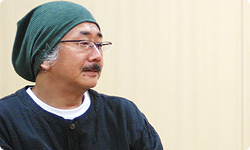
That’s always the difficult aspect of making something when you’re a little removed from the main development process.
Yes… It’s a real pain, actually! (laughs)
Well, that can’t be helped! The music is your baby, and you need to take care of it! (laughs)
No, I’m not complaining about that! (laughs) What I mean is that, when you’re working in the same office, you can just meet up and discuss things, can’t you?
It’s true that when you meet all the time, you can bring things up and agree on them quite easily, while if you’re working separately, you have to go to all the trouble of writing emails about issues.
And there are all sorts of things that are difficult to put into words.
Perhaps this is something that’s true of video game development as a whole: in the old days, you could explain the kind of game you wanted to make verbally. But now, there are so many people involved, and the scale of the process has grown so much, that there are elements of the game that you really need to write up and put into design documents to ensure everyone understands them.
I think that when you’re embarking on a new project, it would be ideal to start with a small enough team to make design documents unnecessary. That way, you can discuss things and play about with ideas you’ve hit upon, putting them straight into the program and testing them out. Doing this makes the overall direction of the game clearer. I think this is a really important process. If your first step in a new project is coming up with the design documents, that part of the process becomes rather lengthy.
Yes, it can make it tough going. It really is difficult to try to write everything up and put it in a document.
You wonder why people don’t understand what you’re trying to do. It gets really frustrating! (laughs)
It’s at times like that when you just want to tell them: ‘Look, you’re going to need to come here and see me!’ (laughs)
So you communicate via email with the member of the dev team responsible for audio to check that the music you’ve created has been separated and integrated naturally into the game.
Yes, and after a few months had passed, I went to see how things were going myself. It came as a real surprise. I remember thinking: ‘What’s happened to this song?’ (laughs) It ended up being used in a way that surpassed all my expectations.
What do you think about your songs being cut up into separate sections?
Oh, I don’t have any problem with that, as they really worked within the game. I particularly feel that the way the battle music is now used in the game is far better than just playing the full five minutes.
So you’re happy to see that the music you’ve created has been given an extra dimension. When players say how great the music is, that’s a result of the combined efforts of Uematsu-san, who composed it, and the person responsible for implementing it in the game.
That’s right. Although of course they’re very welcome to think that it was all my own efforts… (laughs)
(laughter)
This was the first time that Uematsu-san’s music has been sliced up to quite this extent.
(laughs)
So usually, the music is not cut up this much?
I’d say it’s normal for, at most, 20% of the music to be cut up like that.
Well, the pieces were composed of a number of different elements, which meant that the melodies worked even when divided into separate sections. I feel very lucky that the music was cut up by someone who had an appreciation of how it was constructed.
I’m sorry to be making use of this interview to double-check things… (laughs) But I did want to ask about the version of that song we made which is missing the intro. Are you okay with that?
Oh, that’s no problem at all.
I’m sure Uematsu-san has parts of the music that he has no problem with being altered, and others where he doesn’t want them to be touched.
Yes, I think that’s true. I felt that I was on dangerous ground with the intro to the song, so I just wanted to be absolutely sure… Are you really sure it’s all right?
I’m telling you, it’s fine! If I had a problem with it, I’d let you know! (laughs)
Today’s discussion has really brought home to me how incredible it is for creative people to have maintained a relationship spanning more than twenty-five years, where you can still get excited about what you are doing, and still take on new challenges.
Yes, you’re absolutely right.
I wonder if I could ask each of you to say something about the music to the readers who are looking forward to “The Last Story.” Could we start with you, Uematsu-san?
Working on this game, I feel as if I got back that spirit I had when I first started my career. I don’t know what kind of response it’s going to get, but right now, I can say that I feel confident we have come up with something really interesting.
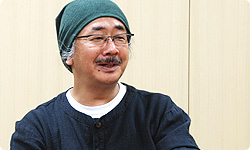
For the first time in a long time, you had to come up with something completely new, and by seeing that new challenge through to the end, you’ve created music that you feel really positive about.
Yes, that’s right. How about you, Sakaguchi-san?
Now, let me think… I’m personally a huge fan of the rhythms Uematsu-san uses, which are reminiscent of Japanese taiko drumming. I’m really happy that this kind of rhythm is used so extensively in the game. There are also songs that use the human voice in really unusual ways. As I mentioned earlier, I really want players to enjoy this music and these rhythms at a high volume, if possible. I am confident that music fans are really going to relish this.
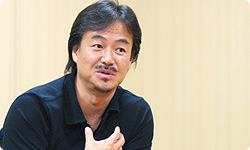
I’m sure that fans of video game music are incredibly excited about this title. Both of you have taken on a new challenge, and you are both positive about the results and pressing players to listen to the music. This is one you are really going to want good speakers for.
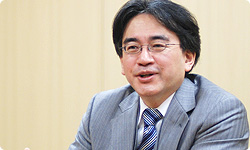
Remember to turn the volume up a bit louder than usual! (laughs)
Thank you both very much.
